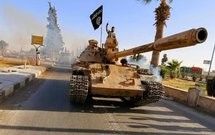 Islamic State militants seized Tabqa air base in the Syrian province of Raqqa on Aug. 24. Forces loyal to the regime of Bashar al Assad had managed to repulse three Islamic State attacks on the base during the preceding days before being overcome in a fourth assault. With the fall of Tabqa air base, the regime has lost control of an entire province for the first time since the Syrian civil war began in 2011.
Islamic State militants seized Tabqa air base in the Syrian province of Raqqa on Aug. 24. Forces loyal to the regime of Bashar al Assad had managed to repulse three Islamic State attacks on the base during the preceding days before being overcome in a fourth assault. With the fall of Tabqa air base, the regime has lost control of an entire province for the first time since the Syrian civil war began in 2011.
Tabqa air base was a major forward operating base for the regime that allowed it to carry out airstrikes at shorter range against Islamic State headquarters and facilities in the city of Raqqa. Over the past month, Islamic State has systematically taken regime bases in Raqqa province, first seizing the 17th Division headquarters and then the 93rd Brigade base. The Syrian regime thus bolstered Tabqa air base in anticipation of an assault.
Syrian State TV aired video footage Aug. 23 that showed considerable defensive works surrounding the base, with armor, artillery and other heavy weapons in place backed up by aviation. The flat terrain around the base and built-up fortifications presented a formidable defensive position, with advantageous and interlocking fields of fire.
Regime forces initially inflicted heavy casualties on Islamic State militants, ultimately killing approximately 400 fighters over the duration of the battle. The Islamic State, however, persisted in its attacks, relying on mortars, artillery, rocket artillery, vehicle-borne improvised explosive devices and the determination of its fighters. The militants finally managed to pierce the perimeter of the air base in considerable numbers, and regime forces appear to have broken and attempted to flee. This loss of unit cohesion allowed the Islamic State to reverse the course of battle, reportedly killing 170 soldiers and capturing 150 more.
The fall of Tabqa air base is a serious military and symbolic loss for the regime. Government rhetoric in recent months repeatedly forecast the return of Raqqa to the control of Damascus. The Tabqa air base was to be the staging ground for a broader regime offensive going deeper into the province. The regime also lost hundreds of troops in the battle for the air base, in addition to the losses it suffered during the other recent seizures in the province. These personnel deficits and the expenditure of resources in ballistic missiles and airstrikes are a drain on the regime at a time when it had been seeking to pursue offensive operations in Aleppo while holding back the rebels in Idlib and Hama. The regime has been left with almost no presence in all of Raqqa province.
For its part, the Islamic State gained a great deal from its seizure of the air base. Past takeovers have yielded considerable ammunition stockpiles, vehicles, artillery pieces and heavy weapons -- and the sprawling Tabqa air base will prove no different. Indeed, photographs from the air base already indicate that militants have seized SA-16 man-portable air defense systems.
Having taken over Tabqa air base, the Islamic State is now in a position to deploy a considerable number of fighters elsewhere that had until now been tied up in Raqqa province. The militants have a number of options. They could swing east toward Deir al-Zour, deploy against Kurdish positions in the north or strike west against both rebel and regime positions. Whatever the course they take, it is clear that the Islamic State remains a credible and dangerous threat to all sides in the Syrian civil war.
Courtesy : Stratfor (www.stratfor.com)